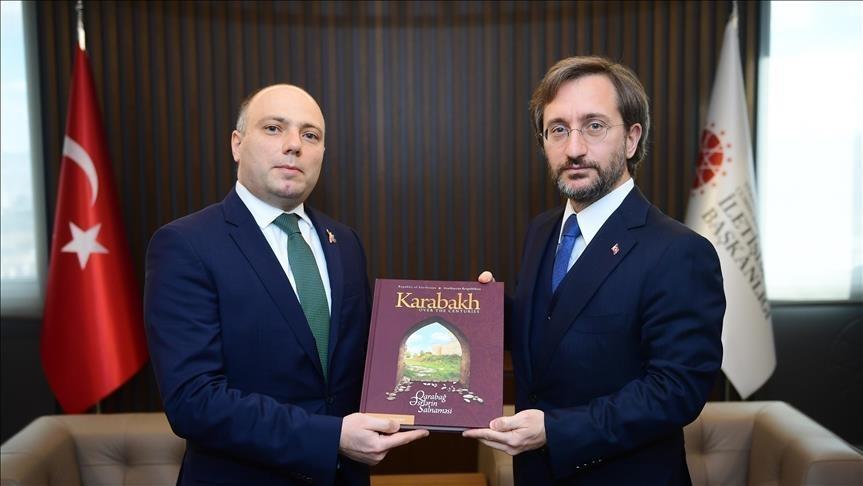Turkey, Azerbaijan agree to deepen cultural cooperation
ANKARA- Anadolu Agency

Turkey's communications director on March 2 met Azerbaijan's Culture Minister Anar Kerimov.
Fahrettin Altun received an Azerbaijani delegation in the capital Ankara, according to an official statement from the Turkish Presidential Communications Directorate.
The two sides discussed ways to improve collaboration in communication, media, culture, and cinema, the statement said.
Speaking at the meeting, Altun said the "two states, one nation" motto was implemented practically in the media coverage of the recent Karabakh conflict between Armenia and Azerbaijan.
"A publication prepared by the directorate in three languages on Azerbaijan's victory in Upper Karabakh is a concrete symbol of brotherly relations between the countries," he added.
Relations between the former Soviet republics of Azerbaijan and Armenia have been tense since 1991, when the Armenian military occupied Nagorno-Karabakh, also known as Upper Karabakh, a territory recognized as part of Azerbaijan, and seven adjacent regions.
New clashes erupted on Sept. 27, 2020, and ended with a Russian-brokered truce six weeks later.
Baku liberated several strategic cities and nearly 300 of its settlements and villages from Armenian occupation during this time.
Before this, about 20% of Azerbaijan's territory had been under illegal Armenian occupation for nearly three decades.
Khojaly massacre
Under the direction of Turkey's President Recep Tayyip Erdoğan and support by Azerbaijan's President Ilham Aliyev, movies and series will also be co-produced on the 1992 Khojaly massacre and the Islamic Army of the Caucasus that liberated Baku in 1918, to showcase our countries' shared history and ties to the world, Altun added.
On Feb. 26, 1992, with the Soviet Union just dissolved, Armenian forces took over the town of Khojaly in occupied Karabakh after battering it using heavy artillery and tanks, assisted by infantry forces.
The massacre is seen as one of the bloodiest atrocities by Armenian forces against Azerbaijani civilians in the Upper Karabakh region, which was liberated by Azerbaijan forces last fall after decades of occupation.
The two-hour Armenian offensive on Khojaly killed 613 Azerbaijani citizens – including 106 women, 63 children, and 70 elderly people – and seriously injured 487 others, according to Azerbaijani figures.
Some 150 of the 1,275 Azerbaijanis that the Armenians captured during the massacre remain missing. In the massacre, eight families were completely wiped out, while 130 children lost one parent and 25 children lost both parents.
Also speaking at the meeting, Kerimov expressed his pleasure on making his first official visit to Turkey.
"Turkey's support for us is not new. Over a century ago, we liberated Baku with the help of the Islamic Army of Caucasus, and, recently we liberated our occupied territories again with Turkey's help. We will never forget these," he added.
Kerimov also thanked Turkey for its support in showing Armenia's attacks on civilians to the world.
















